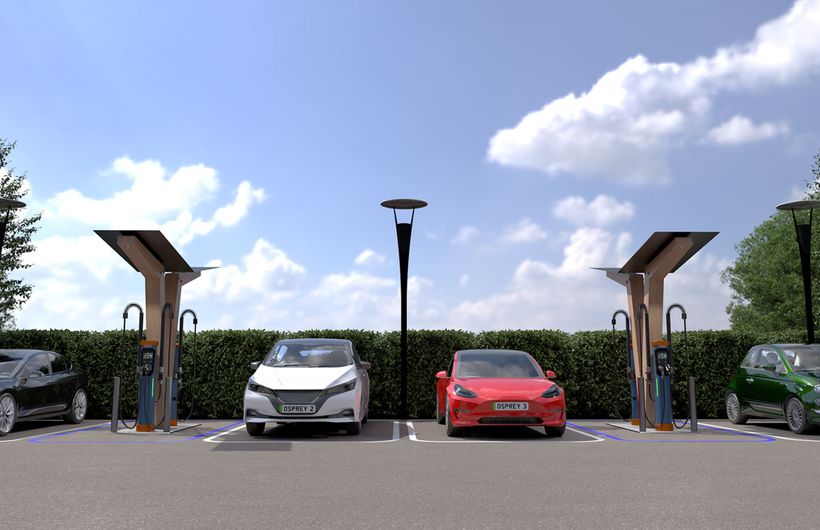Osprey Charging has announced plans to power up 150 all-new rapid charging hubs as part of a £75 million pound rollout. A total of 1,500 150-175KW rapid chargers will be installed across the sites, which will be located on strategic A-roads and adjacent to motorways.
A key component of Osprey’s plan will be the introduction of new charger optimisation technology. Kempower charging technology enables more locations to host multiple rapid chargers on a single site without compromising on charging power or requiring prohibitively expensive grid connections. The technology has the potential to revolutionise EV charging deployment in the UK by intelligently load balancing to maximise the amount of charge that each car receives. The Kempower units will complement the familiar Tritium charging units also being installed on new sites by Osprey.
Construction is already underway at four sites and Osprey’s first hub will open next month in Wolverhampton, next to the A463 near the M6. Construction will start on all of the first 10 hubs before the end of the year, with over 150 hubs consisting of 1,500 150-175kW chargers over the next four years.
The locations for the first 10 hubs are:
Banbury, M40
Suffolk, A14.
Essex, A127.
Glasgow, M8.
East Lothian, A1.
Wolverhampton, A4123.
Birmingham, M6.
Croydon, London, A23.
Crewe, A534
Brackley, A43.
![]() 10 hubs will be started in 2021 as part of Osprey's ambitious plan
10 hubs will be started in 2021 as part of Osprey's ambitious plan Osprey claims that each hub will be located near food and drink amenities, allowing drivers to make use of the facilities while they charge their car. The brand’s first four hubs are adjacent to well-known and popular retailers, including Costa Coffee, Lidl, Aldi, Pizza Hut, KFC and Curry’s PC World. All chargers will be equipped with contactless payment.
![]() Hubs will be positioned next to A-roads and will have a range of facilities for drivers
Hubs will be positioned next to A-roads and will have a range of facilities for drivers Kempower technology
In a UK-first, Osprey’s hubs will deploy a new technology – Kempower – which is enabling more locations than ever before to host multiple high-powered chargers on a single site.
Kempower chargers work together to optimise charging across multiple vehicles when more than one EV is plugged in at the same charging hub. They allow power to be distributed based on demand, which varies significantly between individual vehicles due to the maximum charging rate of each model and its battery percentage at the point of charge.
This power management can reduce waiting times for charging significantly, maximising the speed and availability of chargers for drivers, and increasing consumer footfall for the landowners hosting the hubs.
The load-balancing technology also means grid connections can be optimised, allowing multiple high-power chargers to be installed per site and offering higher charging speeds without the need for more grid power. The physical footprint of each charger is also reduced by 74%, allowing space for more chargers, improved accessibility and reducing their visual impact to support planning permission.
Graeme Cooper, Head of Future Markets at National Grid said: “The widespread transition to EVs means we need to rethink how we make, move and use energy. The power demand for charging will be significant, so it’s crucial that we use the cleanest and cheapest power in our cars and to make the most of each grid connection. By optimising power management at charging facilities, we can ensure a smooth transition away from petrol and diesel whilst maintaining a stable and effective electricity grid.”
![]() Kempower charging tech will allow Osprey to offer more charging connections for drivers
Kempower charging tech will allow Osprey to offer more charging connections for drivers  10 hubs will be started in 2021 as part of Osprey's ambitious plan
10 hubs will be started in 2021 as part of Osprey's ambitious plan 










.jpg?width=600&height=600)



